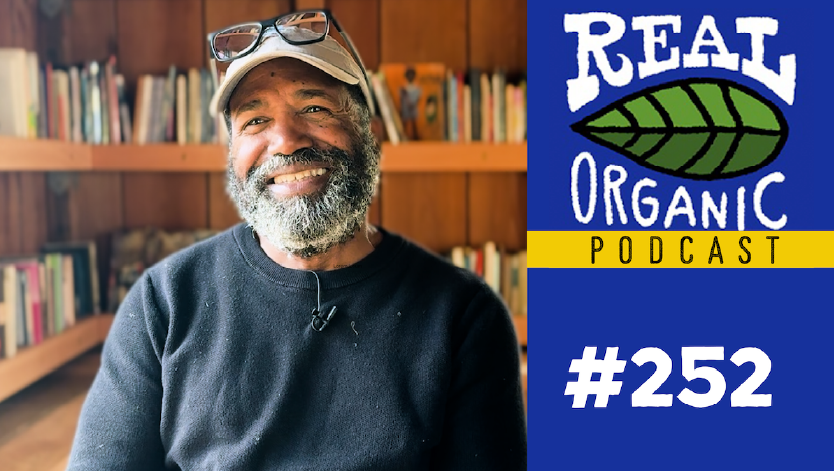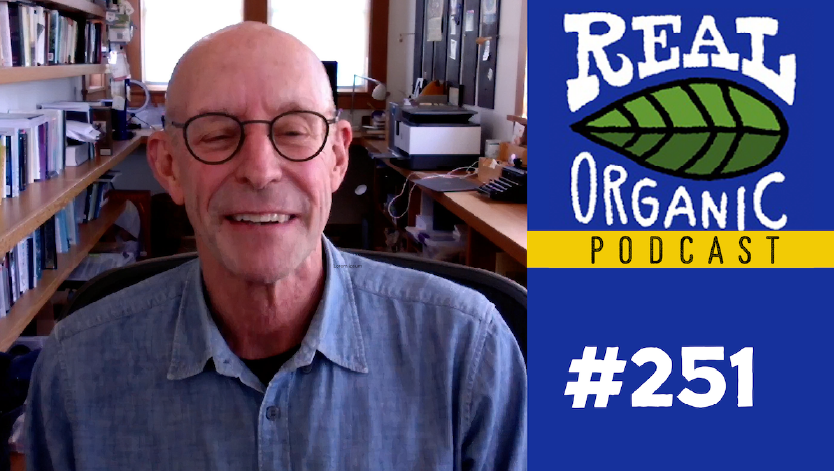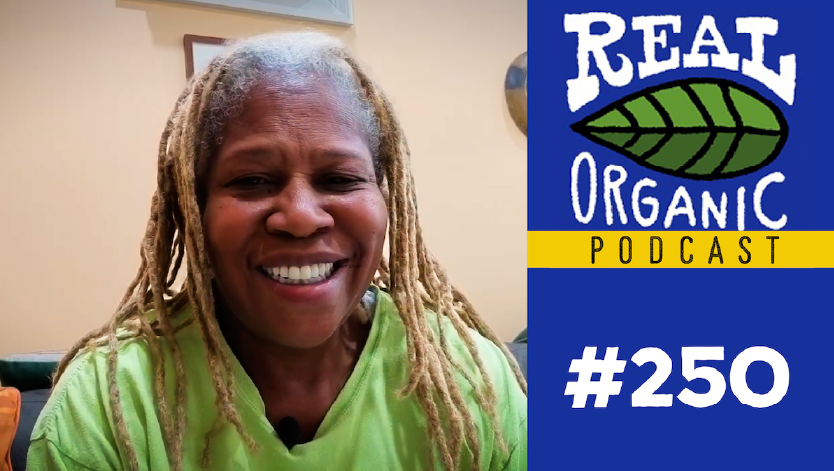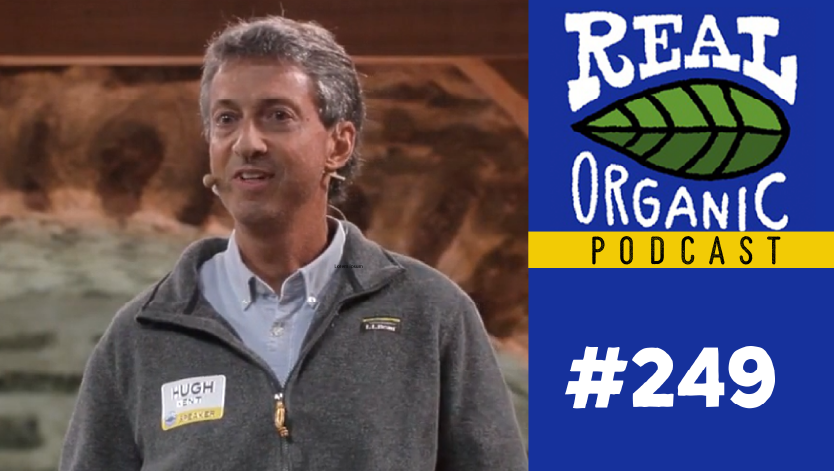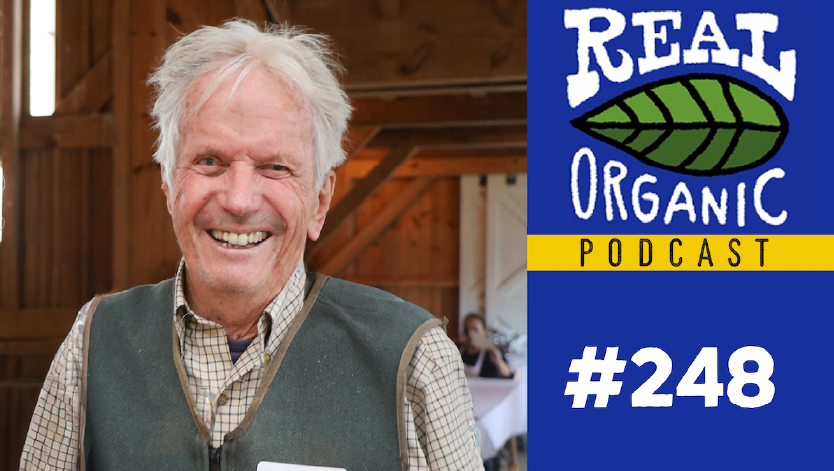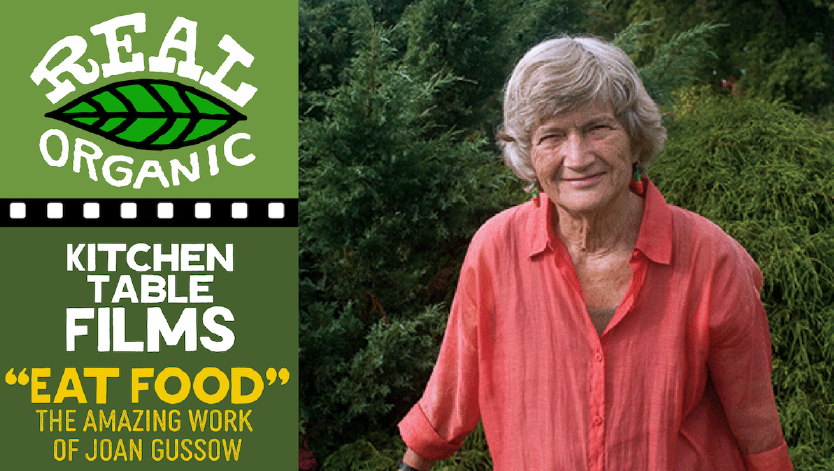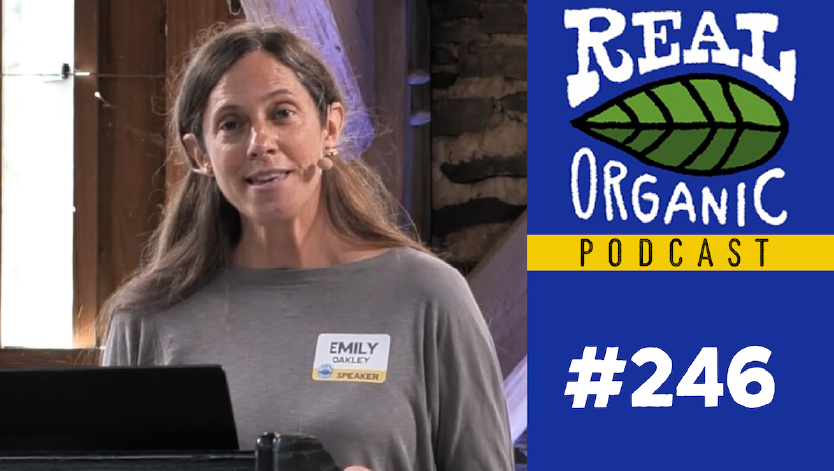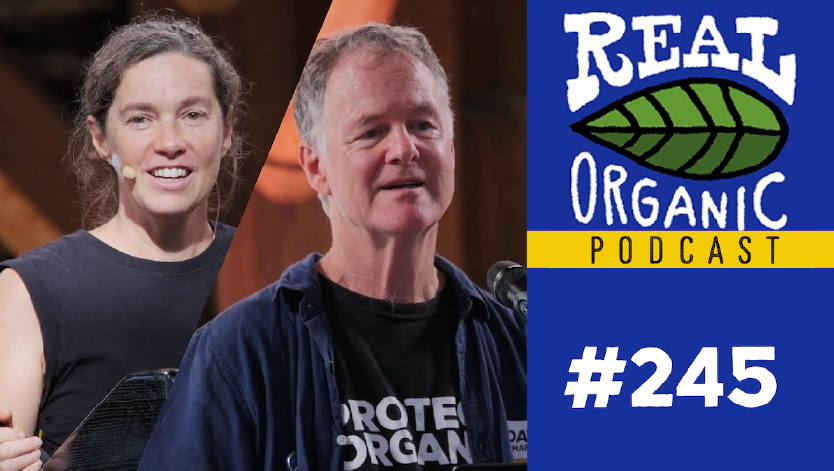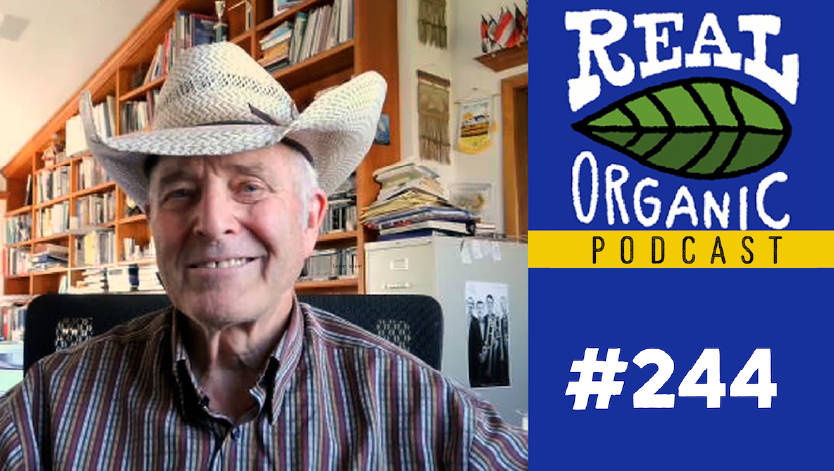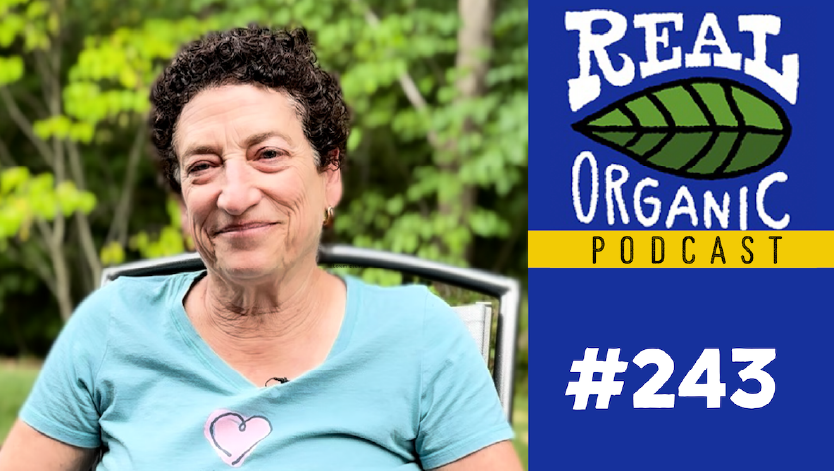Episode #196
Paul Muller At Churchtown 2024: Cultivating Affection
Welcome! You can subscribe and download episodes of our show through your favorite podcast app.
You can also subscribe to receive the video version of each episode on our YouTube channel.
Paul Muller’s talk was recorded live at Real Organic: A World Movement in September of 2024.
Paul Muller shares his talk “Cultivating Affection” on the main stage at Churchtown Dairy on September 28, 2024, for Real Organic: A World Movement:
Linley Dixon 0:00
Our speaker, Paul Muller, has a ton of heart. When I first met his wife, Dru, she drew a big heart in the sand, and she said “farming is love”, and when you go to Full Belly, you feel that more and more the longer you spend there. It’s a beautiful place. Paul…
Paul Muller 0:26
Thank you. I think so. So can everybody just take a deep breath? Just it’s been a long day. Can we breathe in where we are right now? Can we breathe in the smell of hay that was new mown hay that just parked above us to feed these cows in this, in this as winter comes and these cows are going to be here in this very space, and we breathe that in just and we know that when we’re on a farm like this, we are actually breathing the essence of the work and all the effort that’s been done over time by the people who are carrying this place.
Paul Muller 1:10
And so it’s remarkable that we’re here, and we owe a deep dip that gratitude to you. Thank you very much, Abby, for having us here. Thank you for creating thank you for creating this space and for bringing the life of this farm into everyone here who’s going to be sharing it with you. We appreciate that. Thanks to Dave and and Linley for what they’ve done here in organizing this it’s no small feat to put on a conference.
Paul Muller 1:39
I’m going to talk a little bit about something that I think Nora probably talked about a bit. How do we cultivate affection? How do we grow a farm and the community around a farm so that we have something different, that whole different paradigm that we want to grow. We live in a beautiful valley in Northern California, north central California. This is the Capay Valley. We came there about 40 years ago. 40 years ago, I was pretty long-haired hippie, and my wife was a wife of a hippie. We had one child.
Paul Muller 2:12
We came here. We were looking for a place. My family was not so far away, about 40 miles away, and they were farming conventionally. I grew up on a dairy farm, farming conventionally. After many years on a dairy farm and and decided we need to do something different. This 1980 period was a time when for those of you who are older, realize that agriculture wasn’t a free fall. It was one of the last great what they called economist called the ShakeOut, was shaking out excess human capital from agriculture through the engine of free markets. That’s what they called it, and and it was, it was a terribly tragic time for people in agriculture, people I knew, families, I cared about, neighbors, were all being affected by the economics of agriculture and the technologies that they were, in fact, employing to live. We, we lived.
Paul Muller 3:10
We moved to this valley. And this was an agricultural valley that when we moved there, it was euphemistically known as the No Pay Valley, because of that period of time, the this was the home for Wintun indians that were Native people that lived here for some 10,000 years. So we we appreciate being able to to live in this place. It was a place that that’s so different than where we are here.
Paul Muller 3:33
California is a is a remarkable spot where we farm crops nearly year round. It’s a drier climate. We have high temperatures in the summertime. Of this year was about 118 for about a week, and in the in the wintertime, we get about 40 inches of rain. But in that dry, rainy climate, climate that we have, we can grow a lot of different crops. So for for the the 40 years that we’ve been here, we’ve been trying to develop a model farm that would answer some of the social questions and some of the questions of why farms were failing, and could we develop something different? It was, it was a we were looking to throw, in a sense, a life, life raft to to farmers so that we’re failing. We’re looking to to create ideas about how we might steward the ground differently, how we might tenure it, differently, how we can grow a family there, differently so that we could survive there.
Paul Muller 4:28
So Full Belly Farm was the name that was given to our farm by a neighbor who said, when Dru was pregnant with our first child, you that looks like a fat belly farm. You guys got going there, and it became Full Belly Farm. And my mother looked at that thought, saw that name, and thought that that was perhaps the worst name ever, ever thought about that. How would you call yourself? What would people think if you called Full Belly Farm? But that’s, that’s what we we called ourselves. It was based on some of the principles of right livelihood, right action, right relationships, those things. That we felt we needed to to employ in our tenureship with a place that so that we could grow something very, very different. We’ve developed a partnership.
Paul Muller 5:09
One of the amazing things that we did with, I think I probably my for my best first move was I married, married up and married a gal who was wiser than I, smarter than I and definitely more passionate than I about this whole topic. But see, she weathered through those first few years when we were basically just beginning, like every young farmer in here doesn’t have the resources to unsupport, and at that time, there were just not a lot of people talking about what organic was. It was 40 years ago we didn’t know how to grow crops organically. It was something learned, and again, something unlearned. We had to unlearn, I had to unlearn, all the things that I knew about agriculture in order to build, build an organic farm. We were a real organic farm, but, but what we did, I think first best thing was the fact that drew was so passionate and and the work was really hard, but what happened was, I really knew that I had a keeper.
Paul Muller 6:05
Then one day, she actually said to me, you know, I’ve kind of had it here, and this is this too much, having having two kids. Then was, was, was too much, and we, we probably should think about getting a cow. She said, I’d be happy. I’d be happy here if you got me a cow. So that’s the kind of gal I had. And we got a cow, and we and, and we haven’t looked back. We still milk a cow on and we provide all people on the farm with a little fresh milk. So Abby, we have the same impulse, you get a cow, and it goes from there.
Paul Muller 6:37
The other the next significant thing I think we did is when, when our farm was owned by somebody who was a developer, who liked to come up on weekends and drink whiskey and shoot rattlesnakes, he was somebody had a lot of money, didn’t really care about the nature and the character of what we’re doing. The land was in disarray and disrepair, but he liked to drink his whiskey and shoot his rattlesnakes. One night, his wife called us up and said, Chuck died today. Do you want to buy the farm? She didn’t like the place, but she talked to us because we’d been there a while. We were invested there a little bit. Chuck died. Do you want to find the farm by the farm? And so we developed a partnership. We went out and found some friends who were also looking for land. We put together a partnership.
Paul Muller 7:17
That’s the second best thing we did, because if you develop a complex organic farm, I think you need to have a community around you. We moved to a place where the community wasn’t there. It didn’t exist. And we needed to, in fact, grow a community, and that’s a process we’ve been involved in for the last 40 years. So we partnered with Judith Redman and her husband, then Raul. We have another partner. Raul, have another partner, Andrew, my kids are now involved their partners in the farm. So we have through the very beginning of the farm, we knew that farming is not an activity that you do on your own. Okay? Farming at its best is practiced by a community that’s wider and stronger.
Paul Muller 7:59
I met an Amish farmer one time, he said, when when young farmers want to move to a new area, it’s too crowded where they are, and they need to move on. In order to find new land in a new community, they take seven other families with them. Okay, there’s a social construct that’s created by the wisdom of communities that know how to support the agriculturalist in that community that’s critical. I mean, when we have two kids and a cow that needs to be milked, and one of them’s sick, and I’m off at a meeting, and my wife is wondering what’s next, we have a neighbor who will come and help, it’s just, it’s the support that you need in order to become an organic farmer. And I think we’re failing our young farmers pretty miserably on that point right now. So we need to, need to be been, to think about as as a community, how we build stronger networks of farmers by supporting the young farmers that are there.
Paul Muller 8:54
So we’ve been here for about 40 years. We probably grow 80 different crops. The crops are we’ve been from the beginning, all organically grown, trying to figure out what that means. When we first started, the university thought that’s a good way to make again, make the world starve. There is no way that this is going to work. Dru’s major professor called it “voodoo agriculture.” When she said she was meeting marrying this organic farmer, he expressed sympathy and thought that maybe she should try something really different than what she was doing.
Paul Muller 9:28
But we’ve been we’ve been figuring out how to grow a complex ecology of many, many different crops. We’ve tried to figure out how we can put together a system where we’re producing year round, so we can have year round employment for all of the workers that are on the farm, and we can have a year round income. I’m not smart enough to go and borrow money and then bet on the crop that’s supposed to come in and then then pay the bank back. We did that for a few years, and then we realized that you don’t need to borrow money if you. Have cash flow, and the cash flow will will provide enough money to for the next crop. So we, we started from the basics. We bought a tractor, bought used equipment, we we bought a welder and a cutting torch, and we fixed, fix the things we need to, need to know, and 40 years later, we’re pretty, pretty different farm than we ever would have envisioned when we started.
Paul Muller 10:22
Everybody’s talked about how soil is the fundamental. And the reason we’re here today as friends of real organic is that there’s been great umbrage taken about where organic is going and what, and what, in fact, hydroponics means to this, this whole system that we’ve evolved our fundamentals. And what I do, I was going to tell you, it’s going to bring a virtual shovel up here. So you guys know I’m handling a shovel because when you, when you basically walk your farm with people and want to talk about this, this agriculture we’re doing, first thing you do is you take a shovel and you put it in the soil. And the the the impact of that is that you can talk about smell and texture. You can engage senses in people who have no idea of the sensory appreciation of what’s going on. And yet it’s so fascinating, because I think that’s part of our deep memory. There’s pieces inside us that allow us to remember. They say that you can smell soil, the microbes in soil at 20 parts per trillion. It’s almost the same amount of sensitivity this that a shark would have for blood in the water. And then we know there are people talking about sharks and blood in the water and electricity and things like that, but that’s what I’m talking about here. Where you can sensitivity is incredible. We have been been programmed to understand what soil supposed to smell like.
Paul Muller 11:43
So when you take a tour, when you take people out, and I take you on my virtual tour with my shovel, the first thing I’m going to do is put my soil shovel in the ground and show you what’s there. I’m going to also take it and have you feel what’s there. You know, take texture, smell it, experience what’s there. Because much of what we’re talking about when you’re on the farm level, is not something you’re going to quantify. Every day. You trust that in a teaspoon of soil there’s there’s a billion microbes in your handful of soil. Somebody said more, more than the people, people on the earth. I think it’s probably more than that. What we don’t know is profound, and what we work with every day is our medium to create cultural diversity in the foods we eat. So the way you start is with soil. And I think if that message is clear today, that should be the take home for everyone that that we build from the ground up.
Paul Muller 12:36
This is about an eight and a quarter pound baby (shows slide where he’s holding up a mass of soil) that I had my hand up after a shovel full of soil. You hand that you know kind of child, you hand that to people, and you let let them smell it, taste it, feel it, see what the texture is, and it’s part of the education. When you touch soil, it’s amazing. This connection again, you’re there. Serotonin is released right soil can just touching soil can impact your mood. Can impact levels of anxiety. I should probably eat a quarter pound of soil here before we I started but, but they can impact, impact so much of what you actually see and feel and, and, and and is connected to your gut.
Paul Muller 13:21
So soil is is the piece that I think, that differentiates us and it connects us to all of agriculture around the world. The principles that we’re talking about here, about organic agriculture and agroecology and permaculture, all have the same fundamentals. People around the world touch their soil, and the soil becomes part of them. This sharing of what’s happening in your soil means that my footprints on the soil, my interaction with the soil, my creation of the system of soil fertility, is something that I’m doing every day, and I’m interacting with it. It’s interacting with me. It’s, it’s creating my response. It’s not as simple as as a farmer working as soil, the soil is actually and the environment is actually creating my response to that. Because it’s an intimate thing. We.. you grow with it. It becomes part of who you are.
Paul Muller 14:16
So the soil microbiome is, is, is incredibly wild, but as also in every seed that’s grown. Do you know that they talk about a billion microbes in every seed that become the inseminator, the piece that is is informs that seed. When that little radical and the seed, seed sprouts, it moves out and it creates a fungal sheath and a sheath of protection around that seed. It’s profound system that is shows that this in every piece of information that’s been gathered and that you’re using in your farm, there’s genetic information, there’s exchange that seed, radical goes into the soil and becomes part of what informs the health of. Plant, but also informs, in this connection between growing plant and living root, what’s happening in that soil.
Paul Muller 15:06
So we grow at all times, a vast array of cover crops. The wintertime, we’re growing crops that we grow for multiple reasons. We grow them for soil fertility. Our shovel out full out there would show a different response in every field that we have to cover crops in, we grow them for the beneficial insects that can be there. So we’re creating this complex mix of microorganisms, plant tissue, carbon that we’re gathering, and we’re growing insects and birds and all the things that live in there. So you’re creating, by your own hand, this multi storied agriculture that is then part of the decay process that you’re managing.
Paul Muller 15:42
So we are managing, and we are interacting, at all times, with the functions of our soil. And it creates, creates a richness to what we do, what we’re doing. It creates the fertility cycle that drives our farm. So Scott talked really eloquently about how these these systems can allow you to move away from the use of nitrogen fertilizers that are derived from natural gas. It can can reduce all of your inputs. And basically, the systems that we’re employing that can be employed around the world are these systems we can always harvest more sunlight. We can always use plants as the mediator between the sunlight that we’re harvesting and the microbial life in the soil, they’re gathering carbon, they’re gathering gathering nutrients, and they’re putting filling out the whole environment.
Paul Muller 16:30
The farm also has about 300 sheep that we move through the farm. The sheep are part of the digestion process. They enrich soil ecology and soil fertility. And some of these principles are applied throughout the world, as you see integrated agriculture moving toward animals as critical piece of informing the whole system. My son is is does the shearing. He’s also… that’s Rye on the left. He’s also our mechanic. He’s also incredibly versed in all aspects of the farm. He’s smart enough to be just about anything, but he we, I think, with time, we grew a farm that that made an opportunity for him to be there and express his love for this diverse ecology. We impacted his microbiome, so he had tremendous amount of action.
Paul Muller 17:18
We have interns that have also been part of the farm. For since we beginning, part of our mission, I think, is to grow new farmers. Okay, new farmers need places to learn and would be supported and move to where they can be their own farmers. We’ve probably had now 10 to 15 people who’ve grown from 250 or so interns who actually have become farmers and have their own operations. It’s, it’s, this is my son, Rye who you saw in the previous picture. This was him a little little bit earlier in his life, before we actually had quite as diverse a farm. And what you can see is that he’s, he’s grounded, yeah, he’s being inoculated. He’s taking that in. And you watch kids, what kids do when you put a baby down on the floor, first thing they do is reach for something to put here. They know this is the, this is the mechanism for inoculation. Okay, that and the and that’s, that’s a good thing. Our gut microbiome is a critical piece of our own mental, physical and emotional health.
Paul Muller 18:27
So how do you get your kids? How do you create that next generation? There you also seduce them. Okay, it’s, it’s not subtle. What you’re trying to do is seduce them with sweet things. So we grow something sweet all the time on the farm, if we can. In in the winter, there’s citrus in the in the summertime, it’s melons. In the springtime, it’s strawberries. But we are actively seducing people who come to our farm and our kids with sweet things, because that’s what insects everybody else responds to. So and then now this is the next generation, and they’re all the same way. Their microbiome has been, has been inoculated with our farm. And if we can create a place that’s creative and interesting and fun, we’ve now taken and seduced them with with with an affection for the place that they want to be living in. Okay, so, and it’s not, it’s not a insidious thing. We’re giving them the opportunity to be whoever they are, but they’re the creative process of each of those grandkids. Is that they’re being impacted by the farm, and we’re growing farmers, and perhaps I won’t have a farmer there, but, but they at least have the ability to to know that this is a nurturing place. It’s a creative place, and it’s a place that they can grow their own curiosity in. So there’s their their picture of their micro I going to trust that. I don’t. I’ve never seen that before, but they say that’s that’s a you have trillions of microbes in your system. That’s what we’re cultivating with, with healthy organic farms.
Paul Muller 19:59
This is what. So this is kind of how we see the universe. For so many, for so long,we’ve seen a universe. Universe. That’s a night sky, right? We if you think about the night sky, you that’s what’s what’s been known for centuries. This is what we see. What we now know that is that everything is deeper, okay, the the universe. Now we know how there are billions, billions of galaxies, there are millions, billions of black holes. There’s a pulsating, living, breathing organism that we’re that’s that we’ve period of four, have looked at it through, through us, through through one lens.
Paul Muller 20:27
We’re now looking at the world with a different lens. We’re looking at it at its complexity. We’re looking at the things that we’ve never seen before, but we’ve intuited that were there. Here’s a strands of mycorrhizal fungi attached to a rootlet, where they the bacteria and the microbes are being fed by the sugars that the plant is bringing down to them, and they’re, in turn, finding the things that plant needs. A symbiotic relationship. We are farming that relationship, and what we’re producing, and all of us, I think, as we ground ourselves in this we’re creating culture.
Paul Muller 21:03
We’re creating a human culture. We’re creating a culture, very culture in the foods we create that informs everyone’s gut. I know so when we think about food, a lot of times we’ve been it’s about nutrient density, or vitamins and minerals, that it’s really, in many, many ways, about the culture, the very bacterial microbial life that’s on that because it’s on it, in it, and it’s what you consume to to to inform your gut. So we are basically building connection, deep connections, with our customer base, and building their affection because they can feel it. I’m a true believer in the fact that we remember more than we we realize when something’s right, when a peach is good, or the blueberries are good, or you taste a great tomato, you know that something’s right there. No one has to tell you. You could taste that flavor. You remember it. You remember the things that that that inform your gut, because your gut tells you that’s where you want to go. Okay, so we’re remembering things that.
Paul Muller 22:08
So I just have a few more things. I think I’m almost out of time, but one of the group of people that need to be mentioned in terms of how we our community is evolving, and we have a complex community of customers, people who visit the farm. We have hundreds of farmers, other farmers who have come to the farm. We talk with people about what we’re doing and why we’re doing it. But we have a farm worker community of about 80 who work at the farm. We are now actively involved in trying to create a mechanism where they can actually own their homes. So we’ve helped some farms, farmer, farm workers, get get get homes. We think that we can work with a community land trust who will hold the land, they’ll be able to build and buy the improvements, but they’re connected to the farm, and it’s our our recognition of how all these pieces people have worked on the farm and lived and contributed to the farm need to be recognized and knowledge and made whole by being connected more deeply.
Paul Muller 23:12
So so we’re growing our community. We we’re an open farm, a transparent farm. We’re looking to create connections, real, physical connections, where people put their feet on the ground, and we can talk about what they’re what they’re seeing, what they’re feeling, what they’re eating, what they’re hearing. We’re engaging their senses in a different kind of agriculture. This next weekend, we have Hoe’s Down Harvest Festival, and we’re going to have, oh my gosh. We’re going to have 2500 people coming. We have 1500 people who sleep in our orchard. We have a 13 acre walnut orchard. It’s packed. It’s like a little city. That happens Saturday night, they’re all out there. Sunday morning, they all get in their cars. They leave.
Paul Muller 23:55
We harvest the walnuts, then about a week later, so we can connect people intimately with the place. We can feed them our food. We can tell them why, and we can grow this affection for a community and an agriculture that absolutely needs people to know what where their feet are, to know what they’re eating, to remind themselves what they’re eating and where it’s coming from. It’s an unending process. The we can in for in every farm needs to think about how they can be better at that. Paul was an incredible presentation about how you do that on a macro scale. We’re doing it on the micro scale. We think you need to convince every person that you possibly touch with your food. And we need to think, think about how this larger community supports that young farmer who’s out in Iowa by providing more than just a pat on the back. But how interests that have capacity to support new farmers help them build their community? Because it’s an uphill slog, and there’s no renewable agriculture. There’s no sustainable agriculture. Culture, there’s no long term agriculture without some joy and without some affection and without the RE reinvigoration of the of the communities that exist in every single unique ecosystem that we all represent. So thanks very much. Applause.


